The Decision-Making Octopus
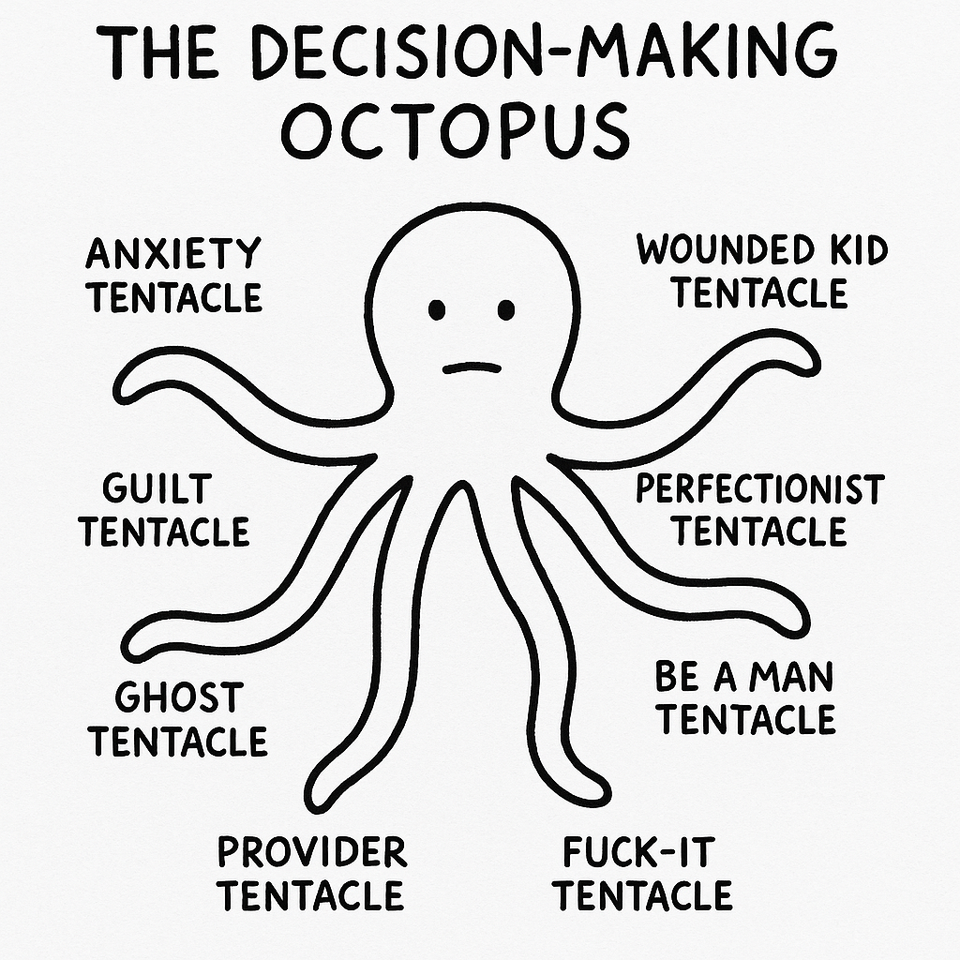
Why Every Choice Feels Like Brain Surgery
Meet the Octopus
There’s a small cottage up in Northumberland I’ve nearly booked nine times.
Stone fireplace. Clawfoot tub. No Wi-Fi. Enough moss on the roof to qualify as a protected ecosystem. It’s the kind of place designed to heal a man. Or at least give him a bit of quiet.
And yet, somehow, I’ve never actually booked it.
The first time, I told myself the timing was wrong. The second, it was the cost. The third, I wasn’t sure if Toby would cope with the change in environment. The fourth, I had the tab open and accidentally closed it because I got distracted trying to calculate how many Saturdays I have left with my dog, statistically.
By the ninth time, I’d accepted that something deeper was happening.
This wasn’t about the cottage.
This was about the Octopus.
The Birth of the Octopus
I don’t remember when it arrived. The Octopus, I mean.
As a kid, I could decide things quickly. Toast? Yes. Climb that tree? Done. Say something honest to someone I love? Maybe not. But I felt my answers, even if I ignored them.
Now? Every decision turns into a kind of internal hostage negotiation.
Order food? Tentacle time.
Buy boots? Tentacle time.
Decide whether I’m a good father? Oh boy.
What is the Decision-Making Octopus?
And before you think this is a metaphor - it’s not.
Well, it is. But also: it’s not.
I’ve seen the Octopus.
(Technically, no. But it feels real.)
It lives just behind my rational mind and takes over the control panel whenever a choice shows up. It’s got eight limbs, each one representing a different internal voice that thinks it knows what’s best for me.
Here’s what it looks like:
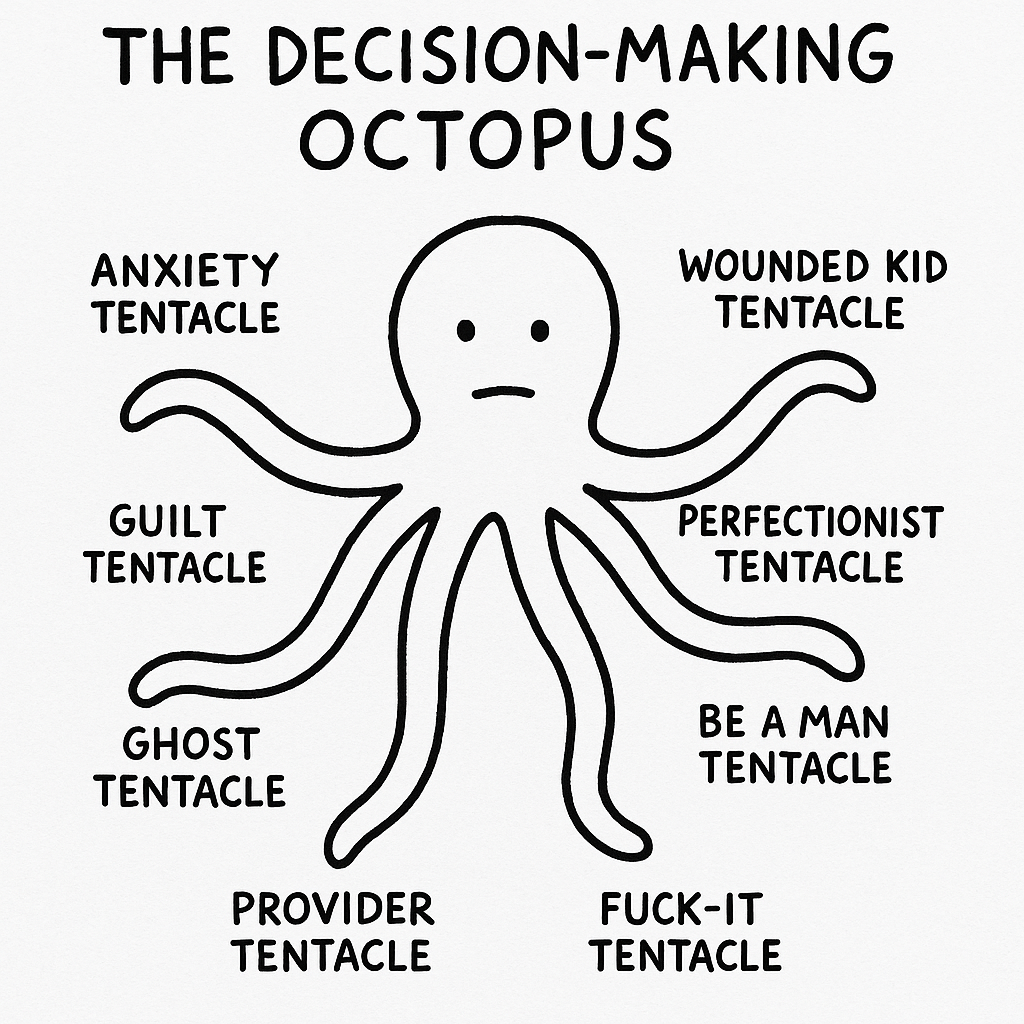
This story is about learning to live with them.
The Tentacles, in All Their Dysfunctional Glory
The first tentacle is Anxiety.
If my brain had a smoke alarm, this is it. Hyper-sensitive, overachieving, and catastrophically unhelpful. It turns “Shall we take the scenic route?” into “What if we get lost, run out of petrol, can’t get signal, and die in a ditch?”
It’s not malicious - it just can’t tell the difference between buying hiking boots and escaping a burning building. Everything is a potential crisis. Everything is Defcon 1.
Its battle cry? “Better safe than dead.”
Then there’s Guilt.
The emotional accountant. Keeps track of everything I’ve ever done wrong - or might be doing wrong right now.
Takes breaks. Adds them to my selfishness column.
Spends money. Flags it as indulgence.
Raises my voice. Files it under “proof of failure.”
Guilt doesn’t argue. It just leans over your shoulder while you try to rest and whispers,
“Other dads wouldn’t need a weekend away.”
It’s quiet. But heavy. Like carrying a rucksack full of unpaid emotional invoices.
Then there’s the one I can’t quite explain: Ghost.
It doesn’t speak. Doesn’t panic. It just lingers.
A smell. A song. A strange sense of wrongness when everything should feel fine.
It’s the echo of something old - grief, shame, confusion. The moments that made me who I am but never got a full chapter.
Ghost doesn’t shout. It just appears. And when it does, every good thing suddenly feels… undeserved.
Provider shows up next.
Hyper-rational. Deeply boring. Wears beige and talks about tax bands.
Wants everything to make financial sense. Doesn’t trust happiness.
Fun? Optional. ROI? Mandatory.
It once made me spend three days researching £30 car batteries. Just in case there was a better £28 version on page five of Google.
Provider means well. But it doesn’t believe joy is sustainable. And it definitely doesn’t trust anything that looks like rest.
Then there’s the Wounded Kid.
The smallest one. The quietest. And often the most honest.
It doesn’t try to win. Doesn’t try to persuade. It just whispers,
“Can we go home now?”
It wants comfort. Repetition. Safety. A warm jumper and some toast.
It doesn’t want the cottage. Or the meeting. Or the hard conversation.
It wants the dog. The sofa. Familiarity. Something soft.
Most days, I don’t listen.
But the days I do? I usually get what I actually need.
Perfectionist is exhausting.
It doesn’t want the best decision—it wants the perfect one.
The one backed by data, blessed by ancestors, and optimised for legacy.
It delays. Rethinks. Loops.
Turns “pick a campsite” into “research all 243 locations within a 25-mile radius and build a spreadsheet with pros and cons.”
It’s not about indecision. It’s about fear in a suit.
Fear that if I get it wrong, I won’t be okay. That I’ll prove something I’m trying not to believe about myself.
Then there’s the Be A Man voice.
It doesn’t spiral. It doesn’t flail. It just stands there—arms crossed, unimpressed.
It speaks through silence. Through old expectations. Through inherited blueprints nobody updated.
Don’t flinch.
Don’t complain.
Don’t need anything.
And whatever happens—carry on.
I don’t hate it. I just don’t serve it much anymore.
And finally: the Fuck-It Tentacle.
The wildcard. The rebel.
The one that starts sentences with “Hear me out…” and ends them with “…let’s disappear into the woods.”
It’s reckless. Impulsive. But sometimes - it’s right.
It reminds me I’m alive. That joy doesn’t need a reason. That it’s okay to just go.
Sometimes the best decision I make is when I stop trying to justify the decision at all.
That’s the full crew.
Eight limbs. Pulling in eight directions.
No wonder I can’t book a cottage without existential dread.
Where the Octopus Came From
And Why It Probably Isn’t Going Anywhere
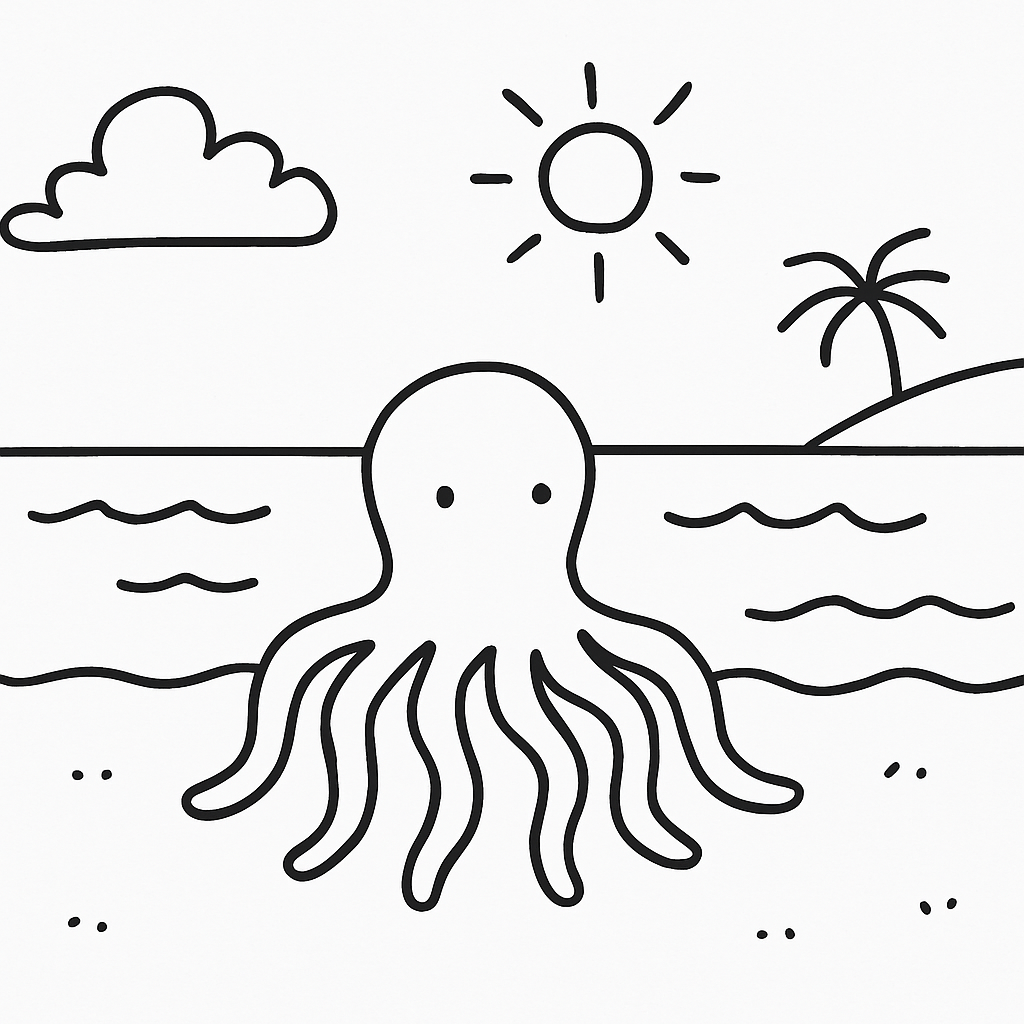
Nobody tells you becoming a man is mostly paperwork, logistics, and quiet panic.
There’s no ceremony. No moment where you’re handed a sword or a set of values. It just happens slowly - through tired eyes, unspoken responsibility, and decisions that feel small but echo louder than you thought they would.
You’re seventeen and bulletproof.
Then suddenly, you're in your forties with a mortgage, a half-fixed truck, a kid who doesn’t speak, and an emotional support cockapoo you didn’t realise you needed.
Somewhere in that shift, the Octopus was born.
But here’s the part that matters:
It didn’t start as chaos.
It started as protection.
Childhood: Where It Learned the Job
Every kid builds a survival system.
Some shout. Some vanish. Some become comedians. Some become mind readers, learning to anticipate moods like weather patterns.
I chose calculation.
“If I say this, they’ll react like that.”
“If I stay small, I won’t draw fire.”
“If I do what’s expected, nobody gets hurt.”
It worked. It kept me out of trouble. Kept me likeable. Kept things smooth.
But it also installed the first lines of code in my decision-making software:
Decision = Risk
And the longer I lived, the more complex that equation became.
Adulthood: When the Octopus Got Promoted
Your twenties are just a long audition for adulthood.
You get the job. The flat. Learn how to cook three meals. Maybe see a therapist once and call it growth. You start thinking you’re functional.
Then real decisions arrive.
The kind without clear answers:
- Stay or leave?
- Say something or stay quiet?
- Keep pretending or start over?
- Be the man they expect - or the one you needed?
The Octopus senses the shift.
So it upgrades.
No longer a background app—it becomes a full control centre. Installs internal CCTV. Brings in consultants. Starts whispering “Are you sure?” before every move.
It doesn’t trust you anymore.
You’ve made too many mistakes.
So it steps in.
Masculinity: The Default Blueprint
Most of us are handed a manual on manhood that reads like it was written by someone who’s never actually met a human being.
The rules:
- Don’t cry.
- Don’t need.
- Work hard.
- Provide.
- Be strong.
- Be silent.
- If it hurts - bury it.
We follow it because it’s all we know. Until one day, it starts to hurt more than it helps.
But the Octopus doesn’t know that.
It’s built on the old rules.
So it doubles down:
- Push through.
- Don’t rest.
- Fix it. Fast.
- Never ask for help.
Emotion gets overruled by function.
Stillness is mistaken for laziness.
And the space where intuition should live? Replaced by a checklist.
This is how we become efficient.
Reliable.
And completely hollow.
Fatherhood: The Tentacle Multiplier
And then - fatherhood.
You think it’ll come with clarity. That you’ll feel different once they arrive. That something primal will kick in and you’ll know what to do.
But what actually happens is this: You become terrified of everything. You cry at adverts. You second-guess every sentence, every silence, every second of absence. And you realise - you don’t know what you’re doing.
But now you’re someone’s world.
And then there’s Toby.
Toby doesn’t speak much. But he sees everything.
He can’t explain what he needs - not with words.
He lives in a different blueprint. One the world wasn’t built for.
There is no “right” way with Toby.
No checklist. No flowchart. No parenting podcast that covers this.
You can’t optimise a life like his.
You can’t intellectualise him into calm.
You just… show up. And stay.
The Octopus? It hates this.
It wants a plan. A strategy. Something to measure.
But Toby doesn’t measure.
He feels.
And if I want to meet him there, I have to leave the Octopus behind.
Or at least, learn how to stop letting it drive.
Living With the Octopus
You Can’t Kill It, But You Can Stop Letting It Drive
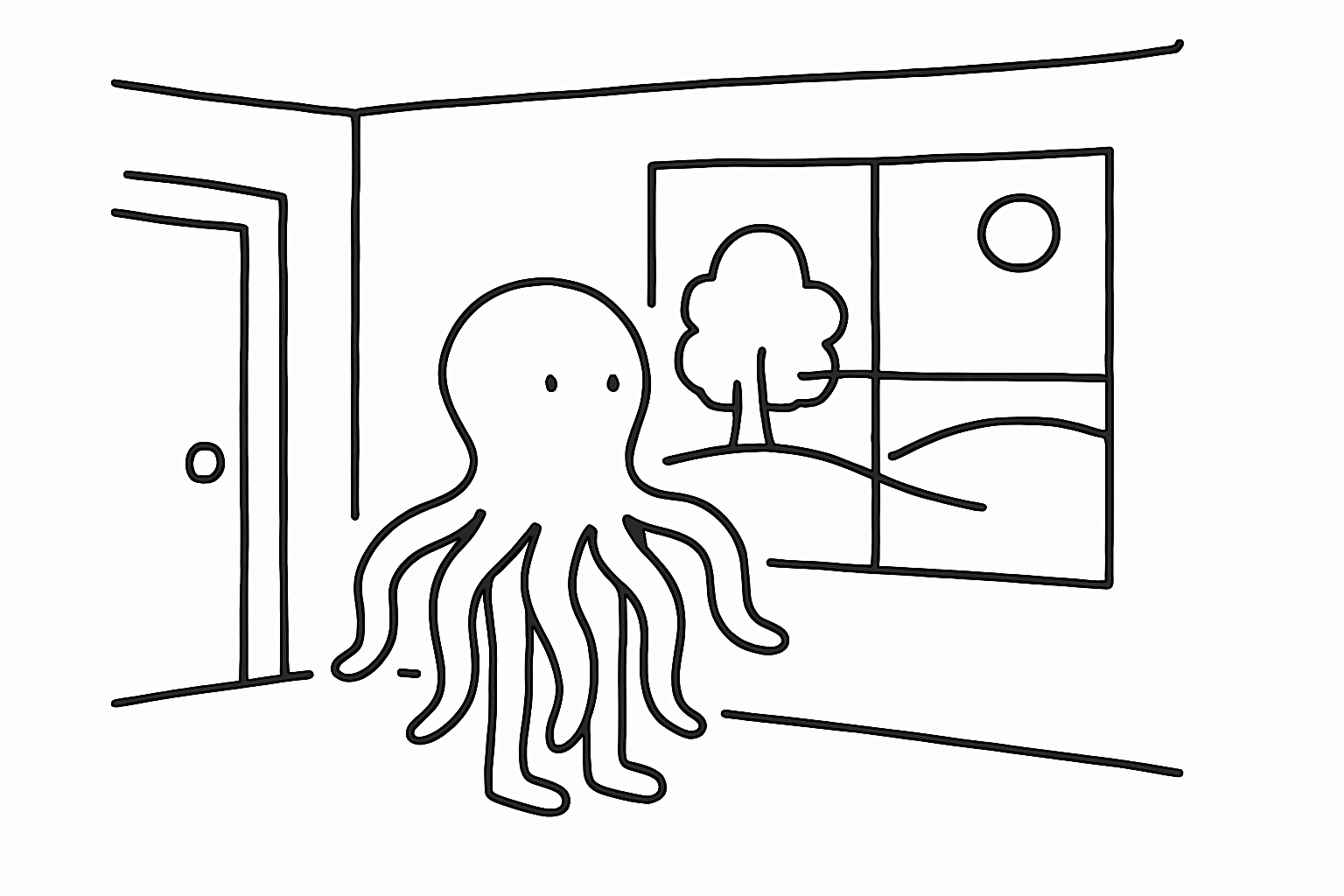
Here’s the thing no one wants to hear:
The Octopus isn’t going anywhere.
You don’t outgrow it. You don’t therapy it away. You don’t “hack” it with a new app or a better sleep routine. I’ve tried.
What happens instead is something… smaller.
Quieter.
And, strangely, better.
You stop trying to win.
You start trying to coexist.
Recognising the Thrash
It rarely arrives like panic. That would be easy.
It shows up in friction.
- You sit down to book something and end up googling the average lifespan of rural heating oil tanks.
- You open your laptop to write and somehow end up scrolling through ten-year-old photos of your kids.
- You find yourself unable to pick a jumper.
That’s the thrash.
It’s not a failure. It’s not laziness. It’s the signal that something matters here.
That a decision has weight.
That multiple voices are wrestling for control.
The moment you notice it, you’ve already stepped outside of it.
That’s the beginning of freedom.
Naming the Tentacles
This isn’t therapy-speak. It’s just language.
And language gives shape to chaos.
When you name the tentacle, you move it from gut to map.
From shadow to shape.
“Ah, that’s Guilt. Again.”
“Okay, Anxiety, thank you, but this is just a train ticket.”
“Perfectionist—you’ve had your say. We’re moving on.”
Some days, I draw them. Literally. Little scribbles in the corner of my notebook.
A scowling face. A clenched jaw. One holding a clipboard.
It helps.
Because the moment you name them, you stop being them.
You become the observer. The host. The one with the final say.
Stop Waiting for Silence
Most men I know - myself included - keep waiting for the noise to stop.
We tell ourselves:
“I’ll book it when things calm down.”
“I’ll speak up when I feel confident.”
“I’ll rest when I’ve earned it.”
But the Octopus doesn’t work like that. It doesn’t reward obedience with peace. It rewards action with clarity.
Book it anyway.
Say it anyway.
Because doing something is often the only thing that drowns out the thrash.
Choose One tentacle
They can’t all lead.
Guilt might have a point. Anxiety might be half-right. But they’re not all helpful right now.
So I try to pick one.
Lately, it’s been the Wounded Kid.
The one who wants toast, not confrontation.
The one who craves comfort, not clarity.
The one who isn’t trying to win - just trying to stay safe.
Sometimes I listen to him. Sometimes I ignore him.
But he’s honest.
And that counts for something.
The Octopus Still Thrashes (And That’s Okay)
A Quiet Ending for a Loud Mind
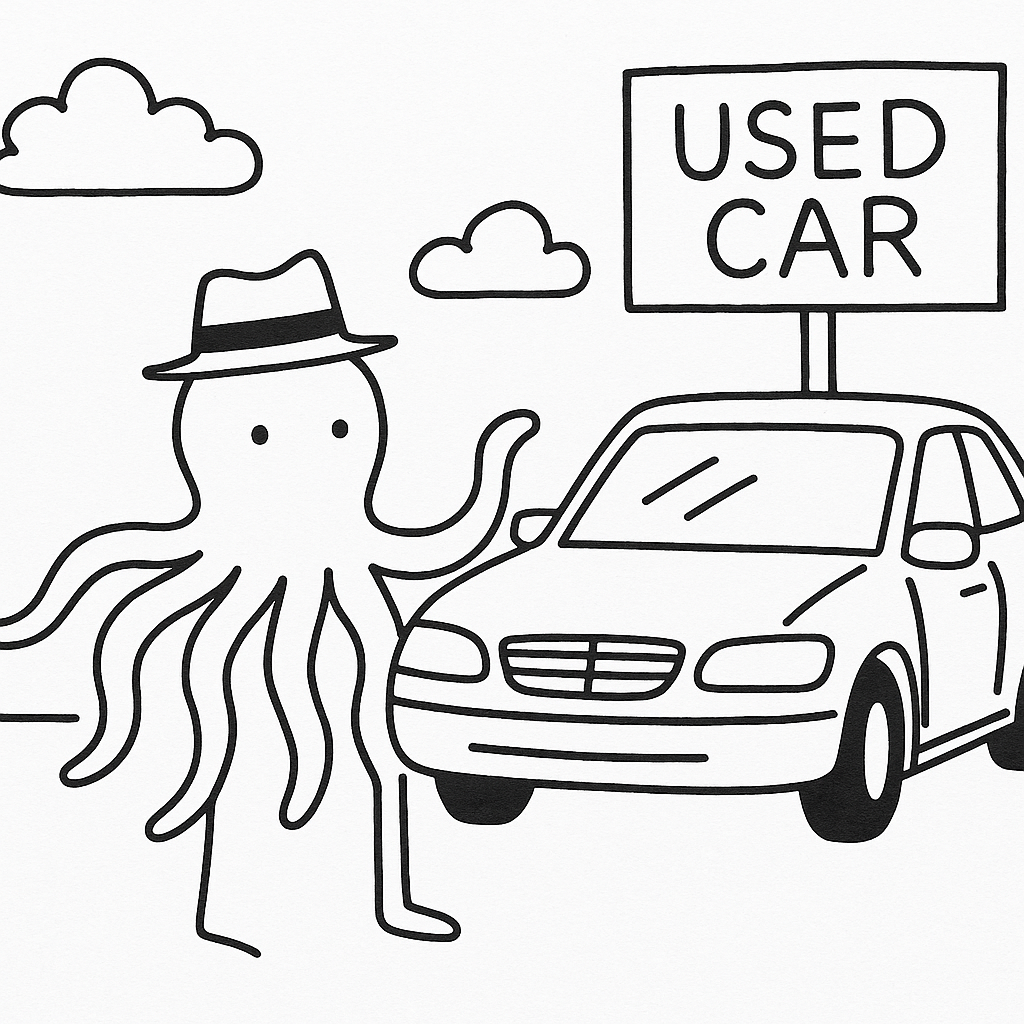
I wish I could tell you the Octopus goes away.
That one day you’ll wake up, stretch, and realise the noise is gone.
No more internal board meetings.
No more guilt, second-guessing, or hoodie-related existential crises.
But that’s not how this ends.
The Octopus still shows up.
Still panics when I open Booking.com.
Still wonders if I’m doing enough, being enough, giving enough.
Still sits in the corner with its passive-aggressive arms folded, waiting for me to flinch.
The difference is - I don’t hand it the keys anymore.
It can whisper.
It can thrash.
But I’ll still act.
Because I’ve stopped asking the Octopus to approve my life.
And maybe that’s what peace actually is.
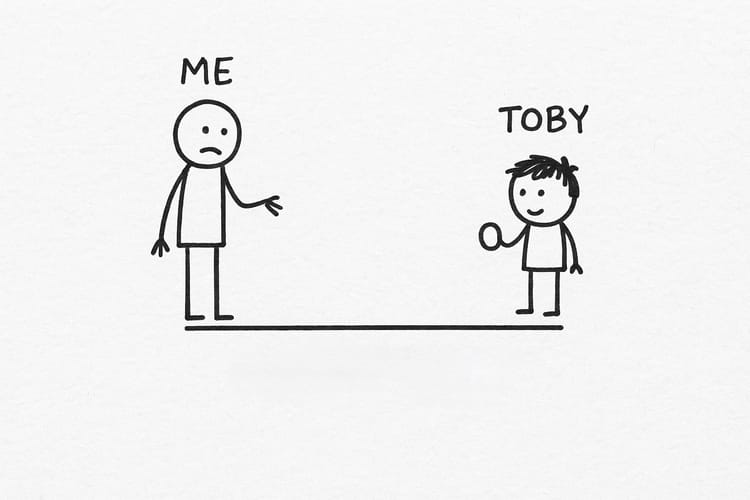
Member discussion